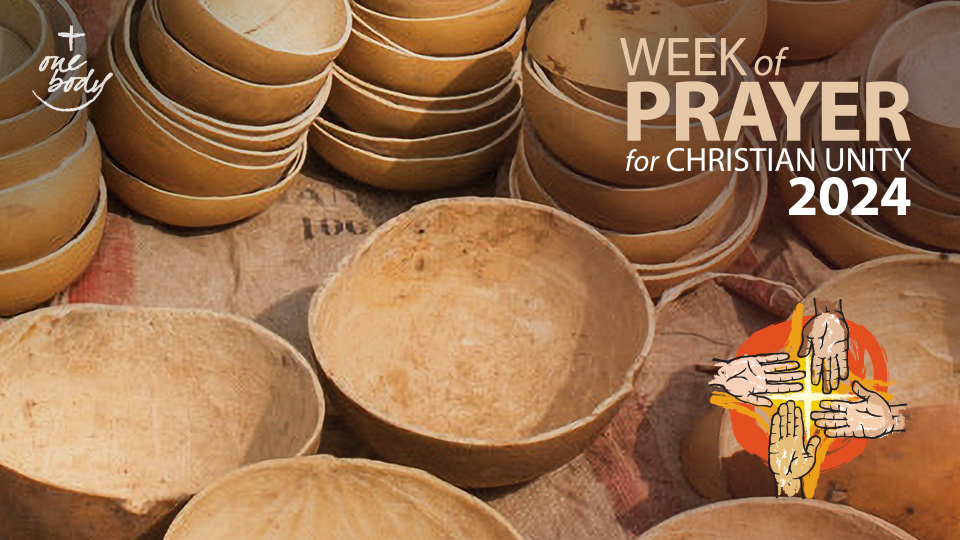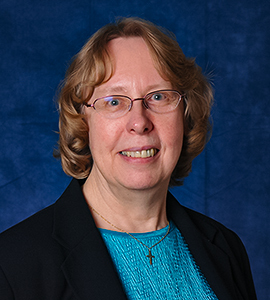Celebrating the 2024 Week of Prayer for Christian Unity | One Body
Sr. Donna Geernaert, SC
Thursday, January 4, 2024


Celebrating the 2024 Week of Prayer for Christian Unity
by Sr. Donna Geernaert, SC
Praying together with other Christians and even with members of other faiths has become so common over the past half century, it’s easy to forget earlier practice. Archbishop Gilles Ouellet, a former chair of the CCCB’s Ecumenism Commission, talked about his experience in the Eastern Townships of Quebec. His father was a town councillor, and in this capacity took the young Gilles with him to attend the funeral of a prominent Protestant citizen. As they were entering the church, he recalled his father saying that they were attending the funeral "because it's the right thing to do." However, Archbishop Gilles was to remember that he was not to pray in that church. In the years following the Second Vatican Council, many Christians from different churches in Canada have been able to participate in various forms of shared prayer. They often pray together during Lent, on Good Friday, at civic occasions and to mark significant national events or support one another in times of tragedy. All sessions of official interchurch dialogues include times for joint prayer. Shared bible studies and prayer groups in neighbouring parishes have become increasingly common. Through local ministerial associations, clergy share in retreats and quiet days. Retreat centres and other institutes that promote spiritual life welcome and are enriched by Christians from multiple backgrounds. In brief, “The believer’s pilgrimage in faith is lived out with the support of all the people of God. In Christ, all the faithful, both living and departed, are bound together in a communion of prayer” (ARCIC II, Salvation and the Church, #22). During the Week of Prayer for Christian Unity (WPCU), however, Christians are not only engaged in joint prayer but in praying together for unity. Initially recognized by an Evangelical Alliance in England in the mid-18th century, the importance of praying for Christian unity became more widespread in the 19th century through the efforts of Anglican clergyman James Stewart and Fr. Ignatius Spencer, a Catholic priest. In 1867, the first Lambeth Conference of Anglican Bishops emphasized prayer for unity in the preamble to its Resolutions, and in 1894 Pope Leo XIII encouraged the practice of a prayer octave for unity in the context of Pentecost. In 1908, Franciscan Friar of the Atonement Fr. Paul Wattson proposed a Church Unity Octave to be held January 18-25, as a time of prayer for the churches to return to the Roman Catholic Church. In 1937, Abbé Paul Couturier of Lyons, France, gave the week a new orientation by proposing a Universal Week of Prayer for Christian Unity to pray “for the unity of the church as Christ wills it, and in accordance with the means he wills it.” Collaboration between the Vatican and the World Council of Churches to produce texts for Week of Prayer began in 1966. Since 1969, materials for the WPCU in Canada have been prepared by an ecumenical committee sponsored by the Canadian Council of Churches. It meets annually with representatives of the Canadian Centre for Ecumenism and the Prairie Centre for Ecumenism to suggest ways of adapting the international materials for use in a Canadian context. The committee also prepares materials for WPCU celebrations in campus ministry as well as activities for children and youth. Texts may be downloaded from the CCC here. To facilitate local adaptation, the Order of Worship for the Ecumenical Service is provided in Word format. Other texts as well as a poster and graphics are in print-ready format.Praying with Burkina Faso
Beginning with Australia in 1975, local ecumenical groups have been invited to prepare a first draft of texts to be used during the Week of Prayer for Christian Unity. For 2024, this role was assumed by an ecumenical team from the West African country of Burkina Faso. With about 21 million inhabitants distributed among sixty ethnicities, its population is approximately 64 per cent Muslim, 9 per cent traditional African religions, and 26 per cent Christian (20 per cent Catholic and 6 per cent Protestant). The international booklet for the 2024 WPCU alerts us that following a "major jihadist attack in 2016, ... the security situation and consequently social cohesion in the country has deteriorated dramatically" (p. 3). More than 22 per cent of the country is outside the control of the government, and Christians can no longer openly practice their faith in these areas. In this increasingly unstable situation, a degree of solidarity is emerging among Muslim, Christian, and traditional religions. Efforts are being made to support interreligious and inter-ethnic dialogue and cooperation, assist displaced persons, and develop strategies for a return to lasting peace. For the Christians of Burkina Faso, the invitation to draft the initial texts for the 2024 WPCU was an opportunity to walk, pray, and work together in mutual love at a particularly challenging time in their shared history. Not surprisingly, they found their theme in the Gospel of Luke: “You shall love the Lord your God ... and your neighbour as yourself” (10:27) and the parable of the Good Samaritan (10:25-37). Reflection on the biblical text in the international materials begins with the assertion that love is the DNA of Christian faith. As Christians, we find our common identity in the experience of God’s love (John 3:16) and reveal that identity to the world by how we love one another (13:35). While the passage selected for the 2024 WPCU reaffirms traditional Old Testament teaching, the lawyer’s question, “who is my neighbour?” is provocative. How far the biblical obligation to love should reach was a matter of legal dispute, and over time, the length of the reach tended to become more and more restricted. When Jesus responds with the parable of the Good Samaritan, he extends the bounds of love far beyond anything expected by the lawyer. Seeking to act like Jesus in loving like the Good Samaritan, Christians are called to respond to all in need without regard for their religious, ethnic, or social identity. The WPCU booklet asserts that it isn't shared identity, but love of neighbour, that prompts them to come to the aid of the other (p. 4). Clearly, the vision of love proclaimed by Jesus in the parable of the Good Samaritan is under threat in today’s world. Wars, widespread social and political inequalities, multiple forms of systemic injustice and marginalization, challenge our ability to live as neighbours. Yet, Jesus prayed for his followers to be one, so Christians cannot lose hope or stop praying and working for unity. In Burkina Faso, particularly during the Week of Prayer, Christian communities live the call to love through mutual hospitality, visiting each other's churches and sharing in worship. They have committed resources to translating the ecumenical French text of the Bible into local languages, helping to lead others to the “inn” of God’s word (cf. Luke 10:34). They cooperate in the promotion of solidarity, peace, and security in the country, recognizing that their mission of service to the world is also the pathway to the gift of unity God wills for the whole human family. Since “there can be no ecumenism worthy of the name without a change of heart” (Unitatis Redintegratio, #7), prayer for unity can be seen as the wellspring of all other forms of ecumenism. It testifies that unity is God’s gift to the church and a fruit of the spirit of love. Ecumenical prayer is at the service of Christian mission and credibility. In his encyclical on Commitment to Ecumenism, Pope John Paul II highlights the importance of prayer:If Christians, despite their divisions, can grow ever more united in common prayer around Christ, they will grow in the awareness of how little divides them in comparison to what unites them. If they meet more often and more regularly before Christ in prayer, they will be able to gain the courage to face all the painful human reality of their divisions, and they will find themselves together once more in their community of the Church which Christ constantly builds up in the Holy Spirit, in spite of all weakness and human limitations. (Ut Unum Sint, #22)How will you celebrate WPCU 2024?
 Sr. Dr. Donna Geernaert, SC, served for 18 years in promoting ecumenical and interfaith relations for the Canadian Conference of Catholic Bishops. She has been a staff member, consultant, and member of numerous multilateral and bilateral theological dialogues in Canada as well as internationally.
Sr. Dr. Donna Geernaert, SC, served for 18 years in promoting ecumenical and interfaith relations for the Canadian Conference of Catholic Bishops. She has been a staff member, consultant, and member of numerous multilateral and bilateral theological dialogues in Canada as well as internationally.
Related Articles:
Category: Canada, Ecumenism
Tag: Canadian Council of Churches, ecumenism, One Body, Week of Prayer for Christian Unity
God in the City: Catholic Journalism Summer Intensive 2025
Monday, March 31, 2025
 Salt + Light Media
Salt + Light Media
Canadian Catholic News is offering an in-person intensive experience of its popular online course, “Telling Truth in Charity: Introduction to Catholic Journalism” this summer.
What does the 500th anniversary of the start of the Anabaptist movement mean for the unity of the church? | One Body
Tuesday, March 25, 2025
 Jeremy Bergen
Jeremy Bergen
Jeremy Bergen reflects on the origins and history of the Anabaptist movement and its implications for ecumenical dialogue.
Dominican Friars Youth Interfaith Video Contest 2025
Thursday, March 13, 2025
 Salt + Light Media
Salt + Light Media
The Office for Interreligious Dialogue and the Dominican Friars of Toronto invite students in grades 9-12 to participate in the 2025 Youth Interfaith Video Contest.
A House Not Made With Hands: St. Anne’s Anglican Church
Friday, February 21, 2025
 Scott Harris
Scott Harris
In June, 2024, the domed roof and interior of St. Anne's Anglican Church in Toronto tragically burned down. However, the parish community continues to stand strong and serve its neighbourhood.
Nostra Aetate at 60: Spotlight on Interreligious Relations | One Body
Saturday, February 15, 2025
 Julien Hammond
Julien Hammond
Julien Hammond looks back on the history of Catholic interreligious dialogue in the six decades since Vatican II's landmark Declaration.













